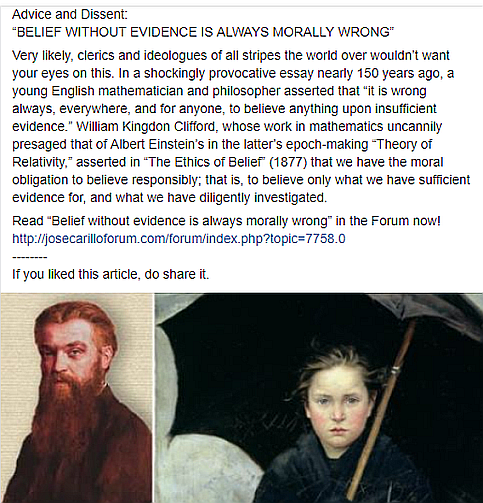This discussion thread about the article posted above, “Belief without evidence to support it is always morally wrong,” came from my November 10, 2018 notice announcing it in my Facebook Gateway to the Forum. I am reposting it here in the Forum for those who may want to share their views pro or con about this admittedly provocative subject. Simply log on with your Forum user name and start posting your views.
Nonmembers may also join the discussion but they need to first register as Forum members. Simply go to the Forum homepage at http://josecarilloforum.com and look for the Member Registration button. Membership is free and applications are normally approved within 24 hours.
 Ime Cerillo
Ime Cerillo How appropriate in this day and age!
 Jose A. Carillo
Jose A. Carillo Maybe so, Ime, but centuries of faith-based indoctrination on many fronts has made the world intractably belief-based without proof nor sense of rationality. Take a look at the world's 2015 religion pie-chart. Who'd dare attempt to reconfigure that pie with rationality in mind? tinyurl.com/y7ykrqvn
 Ime Cerillo Jose A. Carillo
Ime Cerillo Jose A. Carillo That’s what faith is all about.
 Jose A. Carillo
Jose A. Carillo You're absolutely right, Ime, but I'm afraid that the world is no better and will remain no better for it.
 Ime Cerillo Jose A. Carillo
Ime Cerillo Jose A. Carillo Probably. Unscrupulous people always take advantage of the gullible.
 Jose A. Carillo
Jose A. Carillo I don't think only unscrupulous people take advantage of the gullible, Ime. Many religious missionaries and ideologues, who are mostly converts and carriers of unproven but deep-seated--even feigned--belief or philosophies, do it all the time as a way of life. They do it to control the minds of the gullible, acquire power and dominion over them, and generate immense wealth for themselves. You know that they have become even more influential and dominant today owing to the immense power and reach of modern telecommunication media.
 Ime Cerillo Jose A. Carillo
Ime Cerillo Jose A. Carillo Those missionaries and ideologues you are referring to are unscrupulous in my dictionary. Oh yes, I truly get what you mean. The proliferation of different cult-like “beliefs” is proof of the increasing gullibility of the human race, and of course there are those who are ready to jump on that gullibility. I still maintain my stance on faith, faith with discernment not blind faith. A questioning mind is indispensable. But most people want the easy way out, and that is always an option.
 Jose A. Carillo
Jose A. Carillo Ime, extreme fanaticism wasn't an exclusive preserve of the medieval or pre-Enlightenment mind. Look at its present-day manifestations both here in our country and abroad. Doesn't it look like the human mind hasn't really made great progress towards rationality despite greater fact-based knowledge and enormous advances in science and technology? Should most if not all of humanity remain captive to irrational beliefs forever? What can be done to help change this wretched state of affairs?
 Ime Cerillo Jose A. Carillo
Ime Cerillo Jose A. Carillo I was almost tempted to say Education is the way. But then I look at the ideologues, the missionaries, the politicians, and their followers...they’re not all uneducated. I believe, in it’s purest form, the human mind can sift through and discern what is factual, what is irrational, and what is knowable. But we live in a world where greed, want, envy, and hunger for power pollute the mind. In the back of their minds, people know what is true, what is moral, but they choose to look the other way if the truth or morality runs counter to their desires.
-------------------
Forum members are welcome to join this conversation if they have views pro or con that they would like to share about this subject. Simply log on with your Forum user name and start posting your views.